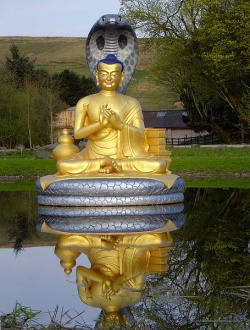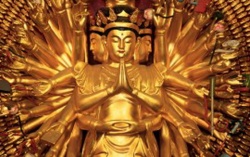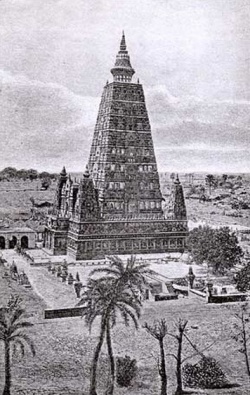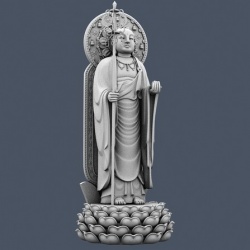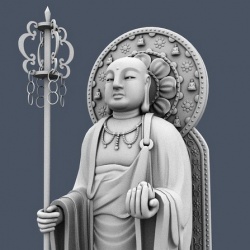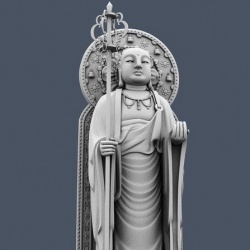Zhuangzi and Nagarjuna on the Truth of No Truth By David Loy
To know how to stay within the sphere of our ignorance is to attain the highest.
Who knows an unspoken discrimination, an untold Way? It is this, if any is able to know it, which is called the Treasury of Heaven. (Zhuangzi, ch. 2, p. 57)
Ultimate serenity is the coming to rest of all ways of taking things, the repose of named things; no truth has been taught by a Buddha for anyone, anywhere. (Nagarjuna, Mulamadhyamikakarika 25:24, p. 262)
A Chinese legend has it that when old Laozi disappeared into the western frontier he journeyed to India and became Sakyamuni Buddha.
I am not in a position to confirm or refute that story, but I enjoy speculating about another:
Zhuangzi, the greatest Daoist philosopher, followed in the footsteps of his predecessor (whom he never mentions) by also traveling to India, where he ... became Nagarjuna, the greatest of the Buddhist philosophers.
Unfortunately for me, this second possibility is even less likely. One problem is the deathbed story in chapter thirty-two, where Zhuangzi declines the lavish funeral his disciples want to give him.
There is also a worrisome historical discrepancy:
Zhuangzi lived in the fourth century BCE, while most scholars place Nagarjuna in the second century CE. No less troublesome, perhaps, is the radical difference in their philosophical styles.
Zhuangzi is unparalleled in Chinese literature for his mocking and satirical tone, which directs its most acid humor at the pretensions of logic;
Nagarjuna is unparalleled in Indian thought for his laconic, knife-edged logic, which wields distinctions that no one had noticed before and many since have been unable to see the point of.
Despite these formidable objections, however, Zhuangzi and Nagarjuna share something even more important: the targets and conclusions of their philosophies are remarkably similar, as I will try to show.
For a start, both are anti-rationalists who present us with strong arguments for not believing in reason. According to A.C. Graham,
"For Zhuangzi the fundamental error is to suppose that life presents itself with issues which must be formulated in words so that we can envision alternatives and find reasons for preferring one to the other."
This error is quite a good characterization of what Nagarjuna does, except for the fact that Nagarjuna uses his dry distinctions to perform a self-deconstruction refuting the hope of logic to re-present the world conceptually.
His magnum opus the Mulamadhyamikakarika addresses the major philosophical problems of his day, not to determine the definitive position but to demonstrate that no conceptual solution is tenable.
Like Zhuangzi, who "temporarily 'lodges' at the other man's standpoint" the better to show what is wrong with that standpoint, Nagarjuna adopts his contemporaries' terminology in order to show what is wrong with that terminology.
On the surface, though, the Zhuangzi could hardly be more dissimilar. It offers a bewildering succession of anecdotes and arguments whose shifting tone makes it difficult and sometimes impossible to determine which voice represents the author. "Where then is the real Zhuangzi? ... the text turns into a hall of mirrors where a frightening succession of images recedes into infinity and illusion becomes indistinguishable from reality."
This postmodernist playfulness, which prefers posing questions to drawing conclusions, functions quite differently from Nagarjuna's univocal dissection of this and that alternative.
It subverts our need for a Master discourse, for that text which subsumes and unifies others into the truth -- that Truth our philosophical labors try to stake out and lay claim to, the perfectly reasonable position that Zhuangzi loves to mock.
What if there is no such Truth? Or is this insight itself the Truth? Is that a contradiction (and therefore impossible) or a paradox (which encourages a "leap" to a different level of understanding)?
These questions will be addressed by considering what Zhuangzi and Nagarjuna have to say about them. Zhuangzi has been labeled a relativist and/or a skeptic, Nagarjuna a skeptic and/or a nihilist, but in their cases such bald designations put the cart before the horse.
We cannot understand whether Zhuangzi is a relativist without first considering what the rest of us expect from the truth.
We cannot appreciate their skepticism without considering what motivates the commonsense belief in objective knowledge.
Instead of inquiring into what kind of a skeptic or relativist Zhuangzi is -- that is, which of our boxes he would fit into (and what fun he would have with that!) -- it will be more fruitful to inquire into the relationship between knowledge and other important themes for him: no-self, mind-fasting, and dreaming.
The interesting issue, then, is not whether the "skepticism" of Zhuangzi and Nagarjuna is consistent with other claims such as no-self, but to turn this around: what context do no-self, meditation, dreaming and waking up, etc., provide for their understanding of our understanding of knowledge?
The illusion of self and things Daoism and Buddhism are unique among the great religions in denying the ontological self.
Anatma non-self is one of the three basic "facts" taught by Sakyamuni Buddha, along with anitya impermanence and duhkha dissatisfaction.
Two of his basic teachings deconstruct the self synchronically into skandha "heaps" and diachronically into pratitya-samutpada "dependent-origination".
These doctrines explain how the illusion of self is constituted and maintained.
All experiences associated with the illusory sense-of-self can be analyzed into one of five impersonal skandhas (form, sensation, perception, volitional tendencies and conditioned consciousness), with no remainder: there is no transcendental soul or persisting self to be found over and above their functioning.
This skandha analysis has, however, been overshadowed and even subsumed into pratitya-samutpada, the most important Buddhis doctrine.
Dependent-origination explains "our" experience by locating all phenomena within an interacting set of twelve factors (ignorance, volitional tendencies, conditioned consciousness, the fetus, sense-organs, contact, sensation, craving, grasping, becoming, new birth, suffering and death), each conditioning and conditioned by all the others.
In response to the question of how rebirth can occur without a self that is reborn, rebirth is explained as one in a series of impersonal processes which occur without there being any self that is doing them or experiencing them.
When asked to whom belong, and for whom occur, the phenomena described in pratitya-samutpada, the Buddha explained that each factor arises from the preconditions created by the other factors; that's all.
The karmic results of action are experienced without there being anyone who created the karma or who receives its fruit, although there is a causal connection between the act and its result.
As one would expect from its very different literary style, the Zhuangzi is less systematic in its critique of the self, yet the rejection is no less clear.
Chapter one declares that "the utmost man is selfless" and chapter seventeen that "the great man has no self" (pp. 45, 150).
Chapter two, the most philosophical, begins with Ziqi in a trance, to reveal afterwards that "this time I had lost my self, didn't you know?" Like other anecdotes about mind-fasting, which explain how to lose one's self, these passages are not concerned to philosophically deconstruct the self into its elements, but they emphasize or presuppose the need to get beyond self.
Why is that so important? One problem with the self is its supposed identity: it provides the continuity that persists through change. Insofar as we value the self-identical, the world as the locus of transformation -- which threatens the self -- tends to be devalued.
Yet Daoism and Buddhism agree that there is no such personal identity or continuity, which means that we are, in effect, depreciating everything that exists in order to cherish something illusory.
Daoist emphasis on the ceaseless transformation of things does not reserve a corner for the self to watch from or hide away in, for it is the transformation of that "self" the Zhuangzi celebrates the most.
On his deathbed master Lai looks upon heaven and earth as a vast foundry and looks forward to being refashioned by the Master Smith.
Will he be made into a rat's liver, or a fly's egg? (ch. 6, pp. 88-89) To resist this is to be preoccupied with the welfare of the self: with satisfying its desires and defending what are believed to be its interests.
Since self does not provide the desired identity, perhaps the most important of those interests is finding or constructing some such identity.
That is, insofar as we have a sense-of-self we also feel a need to fixate it or stabilize it -- a need, however, which can never be fulfilled if the self is indeed illusory.
To have a sense of self without being able to know what this self is, to be preoccupied with something that cannot be secured because it does not exist -- these are formulas for dis-ease (the Buddhist duhkha).
The implications of this for our understanding of truth will become important later when we consider the intellectual ways our minds seek a stable dwelling-place.
The other way to express the problem with self is that it is separate from other things. The subject that observes and manipulates objects becomes alienated from its world. And to experience oneself as separate from the world -- as one of many things in it -- is to experience the world as a collection of separate things, which according to both Daoism and Buddhism is a serious error.
Nagarjuna emphasized that the Buddhist deconstruction of self is just as much a critique of thingness, of the self-existence of things.
The first verse of the MMK asserts its thorough-going deconstruction of the being of all things: "No things whatsoever exist, at anytime or place, having risen by themselves, from another, from both or without cause." Paralleling the contemporary poststructural radicalization of structuralist claims about language,
Nagarjuna's argument merely brings out more fully the implications of pratitya-samutpada. Dependent-origination is not a doctrine about causal relations among things, because the mutual interdependence of phenomena means they are not really things.
The importance of this move becomes clearer when we realize that, although Nagarjuna addresses the philosophical controversies of his time, his main target is that unconscious "metaphysics" which is disguised as the world we live in. If philosophy were merely the preoccupation of some intellectuals we could ignore it, but we are all philosophers.
The fundamental categories of our everyday, commonsense metaphysics are the self-existing things we interact with all the time -- chairs, doors, cars, trees, etc. -- which originate, change, and eventually cease; and in order to explain the relations among these objects the categories of space, time and causality must also be employed.
So we experience the world as a collection of discrete things, each of which has its own being (self) yet interacts causally with others in objective space and time.
The problem with this understanding of the world is not only that it is erroneous but that it causes us to suffer: for we understand ourselves in the same way, as special instances of self-existing things which are nonetheless subject to the ravages of time and change -- which are born only to grow old, become ill, and die.
But if I self-exist, how can I change? How could I die? For that matter, how could I have been born? This is the simple contradiction that Nagarjuna uses to deconstruct self-being. That all phenomena appear and disappear according to conditions means that our usual way of perceiving the world as a collection of separately-existing things is a delusion.
Nagarjuna does not follow this critique by presenting the "correct" Buddhist metaphysics, however, for merely by subverting such ontological claims the Buddhist deconstruction of self-existence (especially our own) can allow something else to become apparent: something that has always been there yet has usually been overlooked in our preoccupation with satisfying desires and trying to make ourselves self-existent.
For Nagarjuna this is our everyday world experienced as nirvana, since there is no specifiable difference whatever between them (MMK 25:19) except for our deluded way of "taking" the world.
For Zhuangzi too the reason we experience this world as a collection of discrete things rather than as the Dao is that we misperceive it.
I have ignored chronology to discuss Nagarjuna first because his analysis is more focused and easier to explicate, which means it can help us with some of the obscure yet important passages in the Zhuangzi, such as the following:
The men of old, their knowledge had arrived at something: at what had it arrived?
There were some who thought there had not yet begun to be things -- the utmost, the exhaustive, there is no more to add.
The next thought there were things but there had not yet begun to be borders. The next thought there were borders to them but there had not yet begun to be "That's it, that's not".
The lighting up of "That's it, that's not" is the reason why the Way is flawed. (ch. 2, pp. 54)
Instead of offering an account of social development or evolution, Daoist history is the story of a progressive decline in our understanding of the Way. Some of the old sages knew the ultimate, which is that there are no self-existing things; everything is a manifestation of the Dao.
Later, people perceived the world as made up of things, but these things were not seen as separate from each other; their interrelationships and transformations meant the world was still experienced as a whole.
After that, people came to see things as truly discrete, the world became a collection of objects, yet even they did not use discriminative thinking to understand the world.
Once people employed and became trapped in their own dualistic concepts, the Dao was lost.
Zhuangzi often refers to the problem of "That's it, that's not"; when that way of thinking lights up, the Dao is obscured.
What is he criticizing? One target is the logical analysis that philosophers go in for, in particular that of the Chinese sophists and Mohists of Zhuangzi's own time.
Yet this by itself is too narrow, for (like Madhyamika scholars who think Nagarjuna's analyses are aimed only at certain Indian philosophical positions) it overlooks the discriminations that we have all learned to make in the process of coming to experience the world in the "ordinary" way other people do.
Chapter two of the Daodejing (a text the Zhuangzi inner chapters never refer to) discusses and by implication criticizes the conceptual dualisms which bifurcate into opposed categories:
"When beauty is universally known as beauty, therein is ugliness. When goodness is universally known as goodness, therein is badness.
Therefore being and nonbeing are mutually posited in their emergence", and the same is true for difficult and easy, long and short, etc.
Nagarjuna is less poetical and more explicit about the problem with such bifurcations: "Without relation to 'good' there is no 'bad', in dependence on which we form the idea of 'good'.
Therefore 'good' [by itself] is unintelligible" (MMK 23:10). In the same way the concept "bad" is also unintelligible by itself (MMK 23:11).
We distinguish between good and bad because we want to affirm one and reject the other, but their interdependence means we have both or neither: since the meaning of each is the negation of the other, one can consciously be "good" only by consciously avoiding "bad".
In the same way, my love of life is haunted by my hatred of death, hope for success is equaled by fear of failure, and so forth.
Insofar as all thinking tends to alternate between "That's it" and "That's not", between assertion and negation, this type of critique tends to end up incorporating all conceptual thinking, including all that we usually identify as knowledge.
This most general understanding is consistent with Buddhist emphasis on letting-go of all concepts and the Zhuangzi passages on mind-fasting, which negates such thinking.
Yan Hui "expels knowledge" by learning to "just sit and forget" (ch. 6, 92), and Old Dan teaches Confucius to practice fasting and austerities to "smash to pieces your knowledge" (ch. 22, 132).
Perhaps we can see how such a radical mental cleansing might also wash away the self, but what would that leave behind? Later we shall need to consider whether there is an alternative type of thinking which does not fixate on "That's it" and "That's not".
Other important passages in the Zhuangzi relate "That's it" thinking with dividing up the world into things, for example:
When a "That's it" which deems picks out things,] the Way interchanges them and deems them one.
Their dividing is formation, their formation is dissolution; all things whether forming or dissolving in reverting interchange and are deemed to be one.
Only the man who sees right through knows how to interchange and deem them one; the "That's it'" which deems he does not use, but finds for them lodging-places in the usual.
The "usual" is the usable, the "usable" is the interchangeable, to see as "interchangeable" is to grasp; and once you grasp them you are almost there.
The "That's it" which goes by circumstance comes to an end; and when it is at an end, that of which you do not know what is so of it you call the "Way". (ch. 2, pp. 53-54)
Although our dualistic ways of thinking cause us to discriminate between things in the world and to see them as separate from each other, the Dao does not discriminate between things but treats them as a whole, for it transforms them into each other.
The next sentence is more obscure:
Burton Watson translates it as "Their dividedness is their completeness; their completeness is their impairment."
This seems to be making a point consistent with the alternation of yin and yang in the I Ching: things take form (yang movement) by individuating, yet with the completion of that movement (e.g., maturity) the yang principle is fulfilled and begins to yield to yin dissolution;
however, the Dao transforms them into each other, at whatever stage, because they are not separate from each other.
Likewise, those who understand this clearly do not treat things as separate from each other.
Such people are not trapped by discriminative concepts which fixate things into this or that, for their more fluid thinking is aware that such designations are always tentative, appropriate only for particular situations and purposes.
Such tentative judgments are made because they are useful; realizing that judgments are to be made according to their usefulness frees one from rigid discriminations and enables us to perceive how things change into each other -- and to realize that is close to realizing the Dao.
The discriminations which are made according to particular circumstances cease when those circumstances change; what remains then is the world experienced as it is before our conceptual thinking divides it up: what is called the Dao.
According to this, the best judgments ("truths") are tentative because they are appropriate only for particular situations and different judgments are needed when those situations change. This perspective is expressed more clearly in the Liezi:
Nowhere is there a principle which is right in all circumstances or an action that is wrong in all circumstances.
The method we use yesterday we may discard today and use again in the future; there are no fixed right and wrong to decide whether we use it or not.
The capacity to pick times and snatch opportunities, and be never at a loss to answer events belongs to the wise.
If ethical relativism means denying a fixed moral standard by which to evaluate situations, one could hardly find a better formulation; yet the last sentence seems to confuse the issue again, by emphasizing a distinction that most contemporary versions do not reserve a place for.
There is an important difference between the sage and the rest of us.
Evidently it is not enough to defend such a relativistic position, or to be a relativist in practice, for those philosophers who accept relativism do not thereby become wise, and those who live relativistically do not thereby live wisely.
Mahayana Buddhism makes a similar point with its doctrine of upaya, the "skillful means" with which the bodhisattva works for the liberation of all sentient beings, adopting and adapting whatever devices are suitable to the immediate task at hand, disregarding conventional moral codes and even the Buddhist precepts when necessary.
This type of relativism too is reserved for beings who have attained a high level of spiritual development -- the Buddhist equivalent of a Daoist sage.
The difference between them and us is that they are liberated by relativism, or into relativism, while the rest of us are more likely to become its victims, since the freedom it encourages panders to our preoccupation with satisfying insatiable desires. In other words, the difference is self.
Those deluded by a sense-of-self are trapped in their own self-preoccupation; ethical relativism clears the way for such people to do whatever is necessary to get what they want.
Since sages and bodhisattvas are liberated from self-preoccupation, because they do not experience others as objects whose well-being is distinct from their own, relativism frees them from the formal constraints that the rest of us seem to need and allows them to get on with the task of apparently saving all sentient beings while actually doing nothing at all (a paradox embraced by both traditions).
If the issue of ethical relativism in the Zhuangzi cannot be understood without also considering the role of self, is that also the case for other types of relativism -- such as knowledge?
Being no-thing
Much of our problem with understanding the Daoist and Buddhist critiques of self comes down to envisioning an alternative.
What can it mean, not to have or not to be a self? In both traditions the answer is: to become no-thing.
The way to transcend this world is to forget oneself and become completely one with it, in which case one is so "empty" of any fixed form that one is able to become any-thing.
That the Buddha (and our own Buddha-nature) has no fixed form by which he can be recognized is emphasized in Mahayana Buddhism, especially in the prajnaparamita sutras whose teachings are very similar to Nagarjuna's.
For example, in the Diamond Sutra the Buddha says that those who attempt to see him by form or sound cannot see him, and that he is not to be recognized by any material characteristic.
The other best-known Mahayana scripture, the laconic Heart Sutra, asserts that all form is emptiness (sunyata), and that realizing our emptiness liberates us from the delusion of self.
For Zhuangzi too no-thingness characterizes the Dao itself, and becoming no-thing is a return to the source from which things including us arise:
There is somewhere from which we are born, into which we die, from which we come forth, through which we go in; it is this that is called the Gate of Heaven.
The Gate of Heaven is that which is without anything; the myriad things go on coming forth from that which is without anything.
Something cannot become something by means of something, it necessarily goes on coming forth from that which is without anything; but that which is without anything is for ever without anything.
The sage stores away in it. (ch. 23, p. 103; Graham's italics)
Having achieved this, the sage can "let the heart [xin] roam with other things as its chariot" (ch. 4, p. 71).
A later chapter quotes the sage Guanyin: "Within yourself, no fixed positions:/ Things as they take shape disclose themselves./
Moving, be like water,/ Still, be like a mirror,/ Respond like an echo./ Blank! as though absent:/ Quiescent! as though transparent./
Be assimilated to them and you harmonize,/ Take hold of any of them and you lose" (ch. 33, p. 281).
The mind as a mirror is perhaps the most important metaphor in the Zhuangzi and provides one of its most-quoted passages, from the very end of the inner chapters:
"Hold on to all that you have received from Heaven but do not think you have gotten anything.
Be empty, that is all. The Perfect Man uses his mind [xin] as a mirror -- going after nothing, welcoming nothing, responding but not storing."
In terms of the image, self-forgetting or mind-losing (wang xin) is the practice of polishing one's mind-mirror and keeping it clean of impurities.
To say the least, such meditative techniques are also important in Buddhism, which is probably the richest of the world's contemplative traditions.
Although Nagarjuna mentions little about such practices, as a monastic he was doubtless familiar with them and they provide the context within which his work must be situated, especially its emphasis on prapancopasama, the cessation of conceptual ways of understanding, which is necessary if one is to experience things as they are.
Burton Watson suspects that the Zhuangzi must originally have been accompanied by similar practices to help students realize what it is talking about, yet all that survives in the text are some references to controlled breathing.
By such practices the xin of the sage becomes "the reflector of heaven and earth, the mirror of the myriad things" (ch. 13, p. 259).
Nonetheless, the mirror-metaphor, like all metaphors, has its limitations.
To be a perfectly-polished mirror is not quite the same as being no-thing at all: there is still a dualism between the reflector and the reflected.
This may encourage the tendency of contemplative types to stand back from the world, but Zhuangzi will have none of that:
"To be transformed day by day with other things is to be untransformed once and for all.
Why not try to let them go? For the sage, there has never yet begun to be Heaven, never yet begun to be man, never yet begun to be a Beginning, never yet begun to be things" (ch. 25, pp. 110-111).
To forget oneself completely, truly to become no-thing, means more than to reflect the transformations of things: it is to be wholly identified with them, to be them -- in which case there are no things and no transformations, since "that which is without anything is for ever without anything" (quoted above).
Such a world is not a collection of things but is composed of events.
Evidently someone who realizes she is no-thing remains no-thing even as she playfully assumes this or that form.
When there is no thing or self that exerts itself to do things, there is the spontaneity (ziran, "so of itself") of actions that are experienced as no actions (wu wei), of transformations that are just as much non-transformations.
When I forget my-self I fall into the world, I become its manifold of interdependent phenomena transforming into each other. What does mean for language and truth? Do they too become such a manifold?
The ignorance of truth and the truth of ignorance
To realize that there are no things is not to float in a porridge where each spoonful is indistinguishable from the next; it is to store away in the Gate of Heaven which remains no-thing even as all things arise from it and transform into each other... If we replace "things" in the previous sentence with "words", what would that imply about language?
According to Graham, grasping the Dao is a matter not of "knowing that" but of "knowing how," as shown by the many craftsmen Zhuangzi is fond of citing.
This distinction is not as useful as one would hope, but it is useful to consider: what would "knowing how" with words be like?
It is no coincidence that Zhuangzi himself provides one of the greatest examples, and not only for Chinese literature.
Clearly there is a special art to this as well, which is not completely indifferent to logic and reasoning as we have come to understand them in the West, yet which is not to be completely identified with them.
One of the delights of the Zhuangzi for Western readers is the way its polyvocal text disrupts our distinction between form and content, rhetoric and logic -- a bifurcation which may be not "natural" but an unfortunate legacy of the Western intellectual tradition.
What is the knowing-how with words that Zhuangzi shows? "The Way has never had borders, saying has never had norms. It is by a 'That's it' which deems that a boundary is marked" (ch. 2, p. 57).
A "That's it" which deems is speech that fixates things and becomes fixated itself, which Zhuangzi repeatedly contrasts with the more fluid "That's it" which goes by circumstances, speech which changes when circumstances change.
The parallel here between things and words is so close that it is more than a parallel, for they reflect each other: our language fixates the world into things, and once they are fixated the words that fixate them are also fixated -- into "the truth".
In contrast to the everyday world of rigidly differentiated objects, the Dao is not an otherworldly denial or transcendence of things, but their no-thingness which enables their interpenetration and incessant transformation into each other; in contrast to the everyday use of words which fixates things by fixating categories, the Dao does not involve an ineffable rejection of language as inevitably dualistic and delusive, but celebrates language such as we find in the Zhuangzi, a playfulness possible when we are no longer trapped by and in our own words.
"Words exist because of meaning; once you've got the meaning you can forget the words.
Where can I find a man who has forgotten words so I can have a word with him?"
Here we are delighted by the tension between needing to escape words that "deem", and the conclusion which delights in words that do not deem.
Why do we cling to words that deem? As one would expect, here too the problem is self. "Saying is not blowing breath, saying says something; the only trouble is that what it says is never fixed" (ch. 2, p. 52).
That's no trouble at all if we don't need to fixate on our words, but the problem is we do: the transformation of words, like the transformation of things, is terrifying to a necessarily insecure (because illusory) self that is always seeking to secure itself.
How uncomfortable it is to realize that our opinion of something is wrong and needs to be changed; how much more anxious do I become when I start letting go of all my opinions about the world and, most of all, my opinions about myself -- to let-go of the self-image whereby my-self is fixated.
If the self is that which needs to settle on "That's it" or "That's not", without such a self there is no need to dwell on one perch only:
What is It is also Other, what is Other is also It.
There they say 'That's it, that's not' from one point of view, here we say 'That's it, that's not' from another point of view. Are there really It and Other?
Or really no It and Other? Where neither It nor Other finds its opposite is called the axis of the Way.
When once the axis is found at the center of the circle there is no limit to responding with either, on the one hand no limit to what is it, on the other no limit to what is not. (ch. 2, p. 53, my italics)
"It is easy to keep from walking; the hard thing is to walk without touching the ground." (ch. 2, W58).
And it is easy to keep from talking; the hard thing is to talk without needing to touch a ground.
According to Graham's gloss, it is easy to withdraw from the world and live as a hermit, it is harder to remain above the world while living in it.
Yet without a self we float quite easily, if its need to ground itself is what weighs us down.
In place of our usual distinction between knowledge and ignorance, this yields a knowing that becomes indistinguishable from a kind of ignorance.
"How do I know that what I call knowing is not ignorance?
How do I know that what I call ignorance is not knowing?" (ch. 2, p. 58) What we usually consider knowing -- deeming that something "is this" -- can reveal our ignorance about the transforming nature of language and things.
What is usually understood as ignorance -- not settling finally on "It's this" or "It's that" -- can reflect our insight into that nature.
If "we have the axis on which things turn, and to start from have that which is other than ourselves, then our unraveling will resemble failing to unravel, our knowing will resemble ignorance" (ch 2, 63).
This "ignorance" of the sage allows her to play with truths freely insofar as she feels no need to fixate herself by fixating on any particular one.
The exception will be when we want to accomplish things in the world, yet that is no problem for the sage, whose free roaming harbors no such schemes. "Since the sage does not plan, what use has he for knowledge?
" For him our usual "knowledge is a curse," whereas "utmost knowledge doesn't plan" (ch. 5, p. 82).
As this last quotation suggests, Zhuangzi's understanding of knowledge and ignorance can be formulated into two levels of truth.
Such a two-truths doctrine is also essential to Buddhism, especially Mahayana, and its paradigmatic formulation is by Nagarjuna:
The teaching of the Buddhas is wholly based on there being two truths: that of a personal everyday world and a higher truth which surpasses it. Those who do not clearly know the true distinction between the two truths cannot clearly know the hidden depths of the Buddha's teaching. Unless the transactional realm is accepted as a base, the surpassing sense cannot be pointed out; if the surpassing sense is not comprehended nirvana cannot be attained. (MMK 24:8-10)
Sakyamuni himself made an implicit distinction between words that deem and words that change with circumstances when he compared his own teachings to a raft that may be used to ferry across the river of samsara to the other shore of nirvana and then abandoned, not carried around on one's back.
Nor did Nagarjuna understand his own writings as committing him to a particular view:
"If I had a position, no doubt fault could be found with it. Since I have no position, that problem does not arise."
How could he avoid taking a position? There is no position to be taught because there is no truth that needs to be attained; all we need to do is let-go of delusion:
"Ultimate serenity [or beatitude: siva] is the coming to rest of all ways of taking things, the repose of named things; no Truth has been taught by a Buddha for anyone, anywhere." (MMK 25:24)
The Astasahasrika, probably the oldest and most important of the prajnaparamita sutras, begins by emphasizing the same point:
No wisdom can we get hold of, no highest perfection, No Bodhisattva, no thought of enlightenment either. When told of this, if not bewildered and in no way anxious, A Bodhisattva courses in the Tathagata's wisdom.
In the Diamond Sutra Subhuti asks the Buddha if his realization of supreme enlightenment means that he has not acquired anything. "Just so, Subhuti.
I have not acquired even the least thing from supreme enlightenment, and that is called supreme enlightenment."
Then it could just as well be called supreme ignorance -- as long as that is not confused with ordinary ignorance.
How does this reconcile with the two-truths doctrine enunciated by Nagarjuna above, which emphasizes the importance of the higher truth in attaining nirvana?
No truth is the higher truth: not a more abstract or profound set of concepts, but an insight into the circumstance-changing nature of all truth.
That makes it sound easy, yet the rub is that such a realization requires letting-go of oneself, which is seldom if ever easy.
The bewilderment and anxiety that the Astasahasrika mentions are the rule rather than the exception.
The basic problem, again, is that discriminating between ignorance and truth -- rejecting the one, grasping the other -- is an intellectual way (is especially the intellectual's way) the self tries to find some secure ground for itself.
With such discriminations we tame the mystery and terror of the world into the truths that are necessary for us to live because they teach us what the world is, who we are, and why we are here.
Untold millions have killed and died defending such truths:
in religion, it is faith in the doctrine which can save us and which therefore needs to be defended at all costs against heretics; less dramatically yet more intimately for many of us, it can also be the "liberating insights" of psychoanalysis and deconstruction, etc., or the "enlightening" Asian wisdom of Buddhism and Daoism.
This is not to deny that they can be liberating and enlightening; but only when we do not need to secure our-selves can we become comfortable with and able to live the lack of such a higher truth to identify with.
Then the truth of no-truth must always self-deconstruct. On the one hand, it needs to be expressed somehow, for without that there is no Daoist or Buddhist teaching and no help for the benighted.
As Nagarjuna puts it, the transactional realm -- our everyday use of language and understanding of truth -- is necessary to point out the surpassing sense of truth, that there is no higher truth whose understanding liberates us.
Yet what one hand offers the other must take away. No statement of this paradox can be final, pretending to offer a definitive understanding, for to do so makes us like the would-be sage who realized that no one should have disciples and promptly organized a group of disciples to disseminate this teaching.
And our intellectual understanding of these issues is liable to make us into converts who, in effect, join his band of disciples.
Dreaming of waking up
Last night Zhuang Zhou dreamed he was a butterfly, spirits soaring he was a butterfly (is it that in showing what he was he suited his own fancy?), and did not know about Zhou.
When all of a sudden he awoke, he was Zhou with all his wits about him. He does not know whether he is Zhou who dreams he is a butterfly or a butterfly who dreams he is Zhou.
Between Zhou and the butterfly there was necessarily a dividing; just this is what is meant by the transformation of things. (ch. 2, 61)
Everything in this world can be taken as real or not real; or both real and not real; or neither real nor not real.
This is the Buddha's teaching. (MMK 18:8)
The meaning of Zhuangzi's celebrated dream has been much debated and always will be, since the ambivalence of its meaning is clearly as much Zhuangzi's intention as the ambivalence of the dream.
The central tension of the story is between Zhuang Zhou waking up and Zhuang Zhou wondering whether he has indeed awakened.
What is the difference?
The story does not want to persuade us that this world is a dream, but to raise doubts about whether this world is a dream.
Evidently ignorance on this matter is more valuable than knowing the answer.
Is that because ignorance is preferable, if we want to truly wake up and experience things as they really are? Or is ignorance itself waking up?
Isofar as we try to understand Zhuang Zhou's dream, it is helpful to place it in context by considering the two other important passages on dreaming in the inner chapters.
How do I know that the dead do not regret that they ever had an urge to life? ...
While we dream we do not know we are dreaming, and in the middle of a dream interpret a dream within it; not until we wake do we know that we were dreaming. Only at the ultimate awakening shall we know that this is the ultimate dream.
Yet fools think they are awake, so confident that they know what they are, princes, herdsmen, incorrigible! You and Confucius are both dreams, and I who call you a dream am also a dream. (ch. 2, pp. 59-60)
This dreaming is less ambiguous than Zhuang Zhou's.
We are all dreaming, which we will realize when we finally awaken.
This assertion must be understood in its wider context, which wonders whether we are wrong to love life and hate death.
Perhaps those who do so are exiles who have forgotten the way home. If so, life itself is the ultimate dream and death the ultimate awakening.
Despite Nagarjuna's unwillingness in the epigraph above to commit himself to one view at the cost of the other, there are prominent passages in the Mahayana scriptures which also unambiguously assert that this world is unreal and dreamlike.
In chapter two of the Astasahasrika, for example, Subhuti declares that beings, all objective facts, and even the Buddha and nirvana itself are like an illusion and a dream.
The Diamond Sutra concludes with the remark that we should view things as like a bubble, a lightning flash, a dream.
There is one more important dream in the inner chapters of the Zhuangzi:
You dream that you are a bird and fly away into the sky, dream that you are a fish and plunge into the deep.
There's no telling whether the man who speaks now is the waker or the dreamer. Rather than go toward what suits you, laugh: rather than acknowledge it with your laughter, shove it from you.
Shove it from you and leave the transformations behind; then you will enter the oneness of the featureless sky. (ch. 6, p. 91)
This dream is more like the butterfly dream; the speaker does not know whether he is awake or dreaming. But why is it so important for us to know that?
What in us needs to know which is which? Instead of dreaming about waking up, perhaps we should consider why we are so afraid of dreams.
What makes a dream a dream? Things in a dream are unreal in the sense that they do not have any objective stability or self-existence.
They are constantly appearing, disappearing, and transforming into something else. Yet that is also true for this world, according to Zhuangzi and Nagarjuna! In which case the distinction between them becomes less important.
To wake up, then, is to realize there is only the dream. To dream of waking up from that dream is to fantasize about attaining a Reality that will save me from my empty, unfixed, transforming nature, which makes me uneasy because I want to be self-identical.
If so, to "wake up" from my constantly-changing nature (in which I become, say, a butterfly) is actually to fall asleep into the ignorance that thinks "I" am this body, this particular self within a collection of other discrete things.
To dream I am a butterfly, etc., is to wake up to my selfless, endlessly-transforming nature.
Like other dualistic categories, however, the concept of dreaming has meaning only in relation to a concept of waking up and leaving the dream-transformations behind.
Yet the Zhuangzi says that the alternative to dreaming is not another world or higher dimension but "the oneness of the featureless sky." Such a featureless oneness is indistinguishable from no-thing-ness.
It is important to forget oneself and experience this no-thing-ness -- to become no-thing -- because that extinguishes the self; and it is just as important not to remain in that featureless oneness because, in Buddhist terms, that is "clinging to emptiness".
As the Heart Sutra puts it, form is not other than emptiness, but emptiness is not other than form.
Their nonduality is the great dream which we awaken not from but to.
